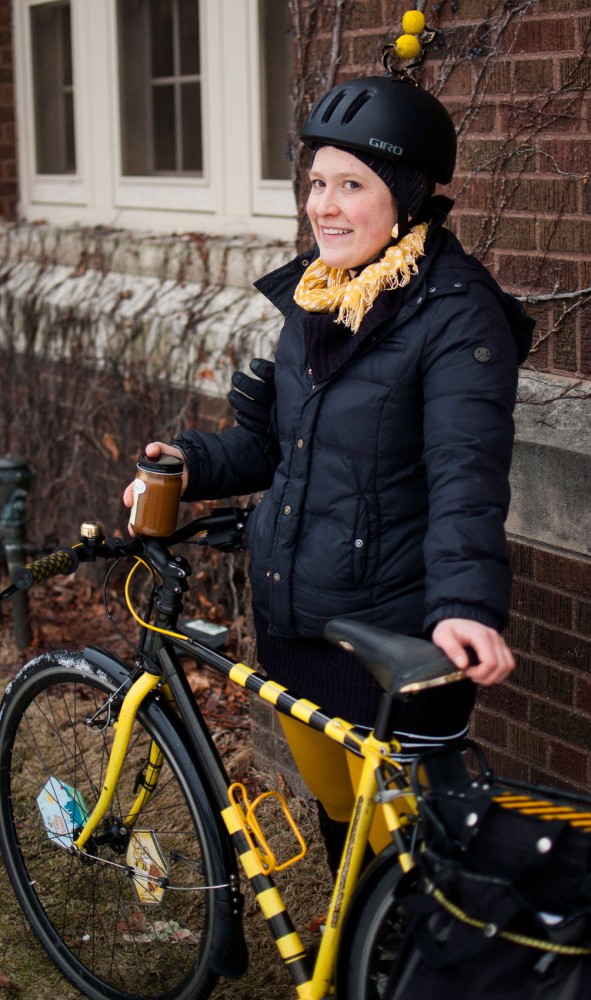The sight of a giant honey bee riding down the street on a bicycle might seem unusual in most cities — but not Minneapolis.
Year round, Kristy Allen and Erin Rupp deliver homemade honey in bee-themed costumes for the Beez Kneez, their local company that provides raw honey and honey bee education programs in the Twin Cities.
Currently, they bike their product to more than 20 different retail locations and about 15 to 20 homes per week, but the two have plans to expand the company as they raise funds for a new headquarters.
The proposed south Minneapolis headquarters would help them expand their honey production while serving as an educational hub for local beekeepers.
So far, their Kickstarter campaign, “Revive the Hive,” has drawn nearly 700 backers and more than $32,000 of their $35,000 goal.
“That honey house will be a place for us to extract, in addition to being another community resource for beekeepers,” Rupp said.
She said they use bicycles partly to reduce car emissions and partly because the bee uniforms they wear for the trips are an eye-catching way to inform people.
“People wave and stop and ask questions,” Rupp said. “It’s a great additional way to educate folks.”
Allen, a University of Minnesota alumna who founded the organization, handles most of the delivery duties and posts stories of her interactions on the road on the group’s Facebook page.
Though the outfits are a novelty, the quality of their honey is far from a gimmick, said Tom Hudson, a south Minneapolis customer.
“We love it, not just the fact that it’s local honey, but it’s super delicious,” he said.
The difference between their honey and others is that it’s raw; it isn’t heated up to become a liquid in the bottle, Rupp said.
Hudson said their buckwheat honey — his favorite — is almost like a molasses, and he looks forward to their twice-monthly deliveries to his doorstep.
“The buckwheat honey is pretty incredible,” he said. “It’s amazing stuff.”
While Allen handles most of the delivering, Rupp, a graduate student at the University’s Humphrey School of Public Affairs, runs the education wing of the program.
Through their education program, Community Bees on Bikes, the two have set up community bee hives and hosted field trips for local schools.
They’ve also worked with the Minneapolis Park and Recreation Board to offer classes to the public. In a city press release, the MPRB said the program is a “unique opportunity to safely explore a working beehive.”
“We’re kind of an intro point of access to honey bees for folks,” Rupp said.
Rupp, who also works at the Bell Museum of Natural History, said the company has a close partnership with the University’s Bee Lab.
“They have a very unique program that combines bicycles and bees,” said Marla Spivak, who runs the lab, in an email. “They raise awareness about the importance of bees to healthy diets.”
Education is especially important now because bees and their keepers are facing tough times. Adult bee populations have had average losses of 33 percent annually from 2006-11, according to the U.S. Department of Agriculture.
Colony collapse disorder, a problem scientists have struggled to find the cause of, is partly to blame for it.
Rupp said more than a third of the world’s crops are pollinated by bees, and without them, food prices could rise as more labor is needed to fill the gap.
“If we lose cost effective fruits and vegetables, the nutrition ramifications of that are pretty dire,” she said.
Biking in business
Bicycling has always been at the forefront of the Beez Kneez’s business and educational plans.
Since 2010, they’ve logged more than 4,000 miles biking around the Twin Cities.
“Sustainability of bicycling is so close to our heart,” Rupp said.
The group started when Allen agreed to sell her aunt and uncle’s honey from their Bar Bell Bee Ranch in northern Minnesota. She gave her bike a bee-themed paint job and wore antennae to complete the image.
They’re an example of some businesses across the country that incorporate bicycling into their business model.
Former Minneapolis resident Benn Schonman, who now owns a sign company in Portland, Ore., started bicycling to his clients six years ago. He said he logs more than 4,000 miles on his bicycle per year, and, if anything, it has helped his business.
“If my car is sitting for three or four days, when I’m not saving on insurance, I’m definitely saving on wear and tear and on gas,” he said. “I really like when I can let my car sit; it’s a real good feeling.”
Schonman pulls a bike trailer with him to carry his sign-making materials, similar to what Rupp and Allen do.
But bicycles aren’t just a form of transportation for the Beez Kneez.
The group converted a hand-powered extractor, which spins honey combs to release honey without breaking them, into a pedal-powered extractor.
Rupp said they have plans for more bicycle extractors, and they might even offer spin classes in their new headquarters for people who want to make honey and get a workout at the same time.
Spivak said it’s an example of some of the exciting and new ideas the two women are bringing to the table.
Though their headquarters could change, Rupp said bicycling will always remain a crucial aspect of the Beez Kneez.








